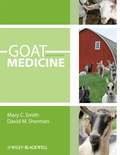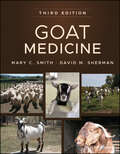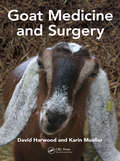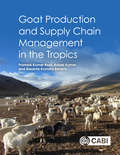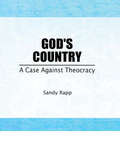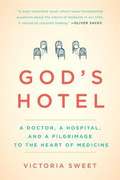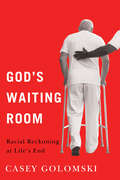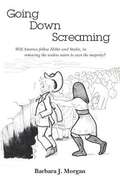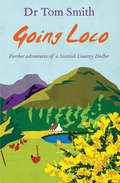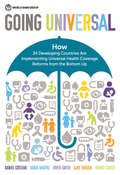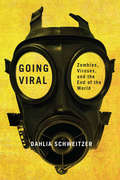- Table View
- List View
Goat Medicine
by David M. Sherman Mary C. SmithFully revised and expanded, Goat Medicine, Second Edition includes discussions on new diseases ranging from bovine spongiform encephalopathy to floppy kid disease as well as major updates on important diseases such as scrapie, mycoplasmosis, paratuberculosis, and urolithiasis. Information has also been added on management of transgenic goats and organic goat production. The text begins by outlining fundamentals of goat practice and moves on to systems-based coverage of the goat. Each chapter provides clinical anatomy and physiology of every system alongside information on relevant clinical signs, differential diagnosis, and system-specific disease.
Goat Medicine
by David M. Sherman Mary C. SmithGOAT MEDICINE Provides readers with an in-depth understanding of the full range of diseases potentially occurring in goats across the wide spectrum of geographic and management conditions in which goats are kept, from extensive grazing to intensive dairy production to backyard pet. Goat Medicine, Third Edition is a complete resource for understanding caprine diseases worldwide. Covering the latest advances on diagnostic and therapeutic techniques, the two authors, board certified veterinarians with a global experience in goat health and production, offer a comprehensive examination of all important diseases encountered in the goat. The book offers authoritative and clinically relevant information on recognizing, diagnosing, treating, controlling and preventing goat disease at the individual, herd, and national levels. To aid in reader comprehension and promote seamless assimilation of the knowledge contained within, the book is logically organized by body system and includes full color images throughout. Sample topics covered within the work include: Control of economically important infectious diseases including caprine arthritis encephalitis, paratuberculosis and peste des petits ruminants, as well as internal and external parasites Differential diagnosis of chronic weight loss and sudden death, anesthesia, and dehorning/descenting Nutrition and metabolic diseases, herd health management, and preventive medicine Formulary of drugs used in goats and suggested dosages, plus options for alternative medicine Scientists, researchers, government veterinarians, laboratory diagnosticians, industry veterinarians, veterinary technicians, and veterinary practitioners around the world can confidently consult this book time and again as an all-in-one, complete resource for all topics pertaining to goat health and disease.
Goat Medicine and Surgery
by David Harwood Karin MuellerAs textbooks go, this is one of the few that I may actually choose to read in a spare moment, not just when madly researching what could possibly be the problem when I get called to a goat farm. It contains interesting information on the background of goat farming, goat behaviour, nutrition and husbandry in the introductory section... This hardback, logically presented book will live on a handy shelf to be used on a regular basis. - Pam Brown, mixed practice vet at Alnorthumbria Vets, Wooler, in Veterinary Record, 27 April 2019 Key features: Covers both goat medicine and surgery Covers basic anatomy, commons breeds and husbandry Includes new and emerging diseases Goats are one of the most widely kept domestic animals globally, mainly as a result of the relative ease with which they can be kept and the obvious benefits provided to those who keep them. Goat Medicine and Surgery describes the key diseases that can have an impact on goat health and welfare worldwide, providing information on diagnosis, treatment, prognosis, management and control. Covers basic anatomy, common breeds and husbandry. Divided into chapters covering each body system Offers the common differential diagnoses, followed by the specific diagnosis and recommended treatments Covers a wide range of disorders, including new and emerging diseases Modern goat keeping gives us a full spectrum of activity from nomadic tribes moving with their animals, to the range-keeping in Australia, to units fattening goat kids for meat and to intensive goat dairy production systems. Alongside these production systems are those in which goats are kept in small numbers as a hobby, as pets and at public attractions. This book deals with the diseases and challenges impacting all kinds of goats and their owners. It will be invaluable to veterinarians in practice and training, animal scientists and agricultural advisors, as well as scientists interested in animal welfare.
Goat Production and Supply Chain Management in the Tropics
by Dr Pramod Kumar Rout Dr Ashok Kumar Professor Basanta Kumara BeheraThis book is a practical manual for goat production systems covering: breeding and selection, feeding based on available crops and resources, and targeted preventative health care for increased productivity and income. It outlines best practice and strategies for setting up a farm, overcoming challenges, increasing milk and meat quality, obtaining sustainability, reducing environmental pollution, optimising climatic conditions and tapping into local know-how. In addition, the book details developing region-specific data for effective decision making and better management, as well as how to run a developmental project to empower stake holders for higher production, support innovation, and analyse the supply chain for better product quality and marketing.
God Behind the Screen: Literary Portraits of Personality Disorders and Religion (Routledge Interdisciplinary Perspectives on Literature)
by Janko AndrijasevicThis interdisciplinary study of literary characters sheds light on the relatively under-studied phenomenon of religious psychopathy. God Behind the Screen: Literary Portrais of Religious Psychopathy identifies and rigorously examines protagonists in works from a variety of genres, written by authors such as Aldous Huxley, Jane Austin, Sinclair Lewis, and Steven King, who are both fervently religous and suffer from a range of disorders underneath the umbrella of psychopathy.
God Isn't Here: A Young Man's Entry into World War II and His Participation in the Battle for Iwo Jima
by Richard E. OvertonWith attention to detail only an eyewitness can offer, Overton's gut-wrenching memoir of the battle at Iwo Jima captures the insufferable horrors of combat at the greatest battle of the modern era.
God's Country: A Case Against Theocracy
by Sandy RappExplore the influence of religion on the privacy rights of U. S. citizens in this controversial new book!Here is a compelling and controversial new book that explores the enormous political influence that some religious groups currently wield. God’s Country focuses particularly on the issue of personal privacy rights and the strategies and rhetoric these religious groups are using to diminish those rights among select segments of society. Author Sandy Rapp, a grassroots activist, shares her experiences in one-on-one debates with religious fundamentalists who have been on opposite sides of the social issues for which she has so passionately fought in recent years. Topics in this fascinating book include: privacy rights individual’s rights as stated in the constitution AIDS and homophobia the abortion choice global population crisis gay and lesbian reporductive rights effective strategies for lobbyingSandy Rapp traces the patriarchal premises which underlie the twentieth-century crusade against homosexuality. She integrates various personal and professional perspectives and provides a challenging and comprehensive examination of the physical and psychological devastation inflicted upon women, lesbians, and gay men due to religious and political control over such personal decisions as the expression of one’s sexuality, the use of birth control, the choice of abortion, and privacy rights. God’s Country poses some provocative questions that are certain to spark debate among enlightened religious professionals, professors, and students of political science, government, women’s history, human sexuality, and religion: Does the government have the right to impose mandatory childbirth upon women? Should a gay or lesbian person’s sexual orientation weaken his/her civil rights? Can, in a free society, the religious beliefs of one denomination or group be imposed on all citizens? If freedom for all is to upheld in the United States, shouldn’t the separation of church and state be maintained?
God's Gym: Stories
by John Edgar WidemanIn God's Gym, the celebrated author John Edgar Wideman offers stories that pulse with emotional electricity. The ten pieces here explore strength, both physical and spiritual. The collection opens with a man paying tribute to the quiet fortitude of his mother, a woman who "should wear a T-shirt: God's Gym." In the stories that follow, Wideman delivers powerful riffs on family and fate, basketball and belief. His mesmerizing prose features guest appearances by cultural luminaries as diverse as the Harlem Globetrotters, Frantz Fanon, Thelonious Monk, and Marilyn Monroe. As always, Wideman astounds with writing that moves from the intimate to the political, from shock to transcendence.
God's Hotel
by Victoria SweetA medical "page-turner" that traces one doctor's "remarkable journey to the essence of medicine" (The San Francisco Chronicle). San Francisco's Laguna Honda Hospital is the last almshouse in the country, a descendant of the Hôtel-Dieu (God's hotel) that cared for the sick in the Middle Ages. Ballet dancers and rock musicians, professors and thieves--"anyone who had fallen, or, often, leapt, onto hard times" and needed extended medical care--ended up here. So did Victoria Sweet, who came for two months and stayed for twenty years. Laguna Honda, relatively low-tech but human-paced, gave Sweet the opportunity to practice a kind of attentive medicine that has almost vanished. Gradually, the place transformed the way she understood her work. Alongside the modern view of the body as a machine to be fixed, her extraordinary patients evoked an older idea, of the body as a garden to be tended. God's Hotel tells their story and the story of the hospital itself, which, as efficiency experts, politicians, and architects descended, determined to turn it into a modern "health care facility," revealed its own surprising truths about the essence, cost, and value of caring for the body and the soul.
God's Nutritionist
by Ellen G. WhiteAs a spiritual leader and pioneering nutritionist of the nineteenth and twentieth centuries, Ellen G. White had a profound effect on millions of people worldwide. Yet, few outside the Seventh-day Adventist Church have known of her work—until now. In this unique book, Robert Cohen presents Ellen White&’s most insightful quotations on health and nutrition, and supports them with current scientific facts that confirm her views.Here are 500 of White&’s &“pearls of wisdom&”—words that are as practical, insightful, and moral as they are accurate. Gathered from her many works, these classic quotations beautifully present her beliefs, from her stand as an ardent vegetarian to her view of dairy products. Whether seen as a slice of history, a book of prophetic wisdom, or a relevant guide to everyday life, God&’s Nutritionist offers both a beacon of light and a path of truth.
God's Waiting Room: Racial Reckoning at Life's End (Global Perspectives on Aging)
by Casey GolomskiCan older racists change their tune, or will they haunt us further once they're gone? Rich in mystery and life's lessons, God's Waiting Room considers what matters in the end for older white adults and the younger Black nurses who care for them. An innovation in creative nonfiction, Casey Golomski's story of his years of immersive research at a nursing home in South Africa, thirty years after the end of apartheid, is narrated as a one-day, room-by-room tour. The story is told in breathtakingly intimate and witty conversations with the home's residents and nurses, including the untold story of Nelson Mandela's Robben Island prison nurse, and readers learn how ageism, sexism, and racism intersect and impact health care both in South Africa and in the United States, as well as create conditions in which people primed to be enemies find grace despite the odds. For copyright reasons, this edition is not available in the South African Development Community and Kenya.
God, Medicine, and Miracles: The Spiritual Factor in Healing
by Daniel FountainWhat is the spiritual factor in healing? Can miracles and medicine have any relation to each other? Dr. Daniel Fountain helps readers rethink concepts about the underlying connection between faith, wholeness, and healing in this articulate and careful study. Through balanced and detailed research on the nature of healing, illness, medical care-giving, and Scriptural faith, Dr. Fountain leads readers through a discussion of the relationship between medicine and miracles.
God, Money, and Politics: English Attitudes to Blindness and Touch, from the Enlightenment to Integration
by Simon HayhoeHayhoe follows the British progression of the blind as immoral, to the need for rehabilitation, to questions of an educational nature.
God—or Gorilla: Images of Evolution in the Jazz Age (Medicine, Science, and Religion in Historical Context)
by Constance A. ClarkAs scholars debate the most appropriate way to teach evolutionary theory, Constance Areson Clark provides an intriguing reflection on similar debates in the not-too-distant past. Set against the backdrop of the Jazz Age, God—or Gorilla explores the efforts of biologists to explain evolution to a confused and conflicted public during the 1920s. Focusing on the use of images and popularization, Clark shows how scientists and anti-evolutionists deployed schematics, cartoons, photographs, sculptures, and paintings to win the battle for public acceptance. She uses representative illustrations and popular media accounts of the struggle to reveal how concepts of evolutionary theory changed as they were presented to, and absorbed into, popular culture.Engagingly written and deftly argued, God—or Gorilla offers original insights into the role of images in communicating—and miscommunicating—scientific ideas to the lay public.
Goed verplegen: Leerboek ethiek voor verpleegkundigen
by Hans van Dartel Ankana SpekkinkDit leerboek ethiek helpt verpleegkundigen en verpleegkundigen in opleiding om reflectieve professionals te worden. Met als doel: antwoord te kunnen geven op de vraag wat goed verplegen betekent voor een concrete patiënt in een concrete situatie. Het boek doet dat met inzichten uit de filosofie, praktische vakgerichte kennis over normen en waarden, en handvatten voor methoden voor moreel beraad.Goed verplegen - Leerboek ethiek voor verpleegkundigen is opgebouwd uit drie delen. Het eerste deel behandelt de kernwaarden van verplegen, het tweede de beroepsnormen van de verpleegkunde. Het derde deel bespreekt ethiek en dilemma’s in de dagelijkse praktijk . Het boek beschrijft daarbij ook welke veranderingen in de Nederlandse verpleegkunde van invloed zijn op het denken over goede verpleegkundige zorg. De theorie wordt geïllustreerd met casuïstiek, en het boek staat vol vragen en opdrachten die de lezer helpen om zich de theorie eigen te maken, en om de reflectieve professionaliteit te versterken. In deze herziene versie is het boek door toegevoegde leervragen en opdrachten naast een theoretisch basisboek verpleegethiek ook een praktisch leer- en werkboek geworden. Het herziene boek biedt daarmee goede aanknopingspunten voor het vormgeven van ethiekonderwijs. Ook heeft besluitvorming in de dagelijkse praktijk een meer prominente plaats gekregen door aandacht voor intuïties en emoties en het gebruik van methoden van moreel beraad.Hans van Dartel is ethicus en verpleegkundige. Hij werkte als universitair docent ethiek in Leiden, was jarenlang voorzitter van Commissie Ethiek van V&VN, en is actief betrokken bij het Netwerk Ethiek Ondersteuning Nederland (NEON). Als adviseur en externe ethicus begeleidt hij commissies ethiek en ondersteunt hij bij moreel beraad. Hij publiceerde over ethiekbeleid, moreel beraad, morele vragen in de gehandicaptenzorg, verpleegkundige beroepsethiek en professionaliteit. Ankana Spekkink is ethicus, docent/trainer en heeft als onderzoeker binnen diverse projecten onderzoek gedaan naar goede zorg. Op verschillende manieren zet ze zich in om mensen aan het denken te zetten over zichzelf en de wereld om hen heen. Ze heeft meerdere jaren ervaring in het verzorgen van ethiekonderwijs en het begeleiden van studenten verpleegkunde bij hun professionele en persoonlijke ontwikkeling.
Goed verplegen: Leerboek ethiek voor verpleegkundigen
by Hans Van DartelDit leerboek ethiek helpt verpleegkundigen (in opleiding) een antwoord te vinden op de vraag: wat is goed verplegen voor deze pati#65533;nt in deze concrete situatie? Daarvoor geeft het boek onder meer theoretische inzichten uit de filosofie, praktische kennis over de beroepscode en over de verhouding tussen ethiek en recht. Al deze informatie helpt je om je oordeelsvermogen te scherpen en situaties beter te analyseren. Uitgangspunt van Goed verplegen. Leerboek ethiek voor verpleegkundigen is dat jij een reflectieve professional wordt. Reflectieve professionaliteit vraagt naast klinisch redeneren ook aandacht voor moreel redeneren en morele leerprocessen. Zorgen voor een ander is immers een morele aangelegenheid, waarbij je je laat leiden door kernwaarden en waarbij je je houdt aan beroepsnormen. En daarvan afwijkt als dat nodig is. Behalve de theorie over de ethiek, beschrijft dit boek veranderingen in de Nederlandse verpleegkunde, zoals de introductie van een nieuw beroepsprofiel en een andere benadering van gezondheid. Bovendien lees je casu#65533;stiek en praktijkverhalen.
Goethe als Naturforscher im Urteil der Naturwissenschaft und Medizin des 19. Jahrhunderts: Themen, Texte, Titel
by Dietrich von EngelhardtGoethe als Naturforscher findet bei deutschen und ausländischen Naturforschern und Medizinern des 19. Jahrhunderts durchgängig Beachtung und führt zu einer Fülle spezifischer Goethe in dieser Hinsicht gewidmeten Studien mit Interpretationen und Beurteilungen – neben wiederholt vorkommenden knapperen Ausführungen oder kurzen Hinweisen in naturwissenschaftlichen und medizinischen Publikationen der Zeit. Übergreifende Veröffentlichungen über Goethe und die Romantik, über seine Stellung in Europa, über seine Beziehungen zu England, Frankreich, Italien, Spanien, den skandinavischen und slavischen Ländern behandeln meist nur seine literarischen und geisteswissenschaftlichen Werke und gehen allenfalls begrenzt auf seine naturwissenschaftlichen Beiträge und ihre Aufnahme in den Naturwissenschaften und Medizin ein. Diese fachspezifische Zurückhaltung gilt auch für Bibliographien der Übersetzungen deutscher Veröffentlichungen des 19. Jahrhunderts in europäische Sprachen; naturwissenschaftliche und medizinische Publikationen kommen in ihnen nicht oder nur sporadisch vor. Der vorliegende Band schließt diese Lücke. Neben einer umfassenden Bibliographie von 260 Titeln von Naturwissenschaftlern und Medizinern über Goethe als Naturforscher steht eine Wiedergabe von 48 entsprechenden nicht nur deutschen, sondern vor allem auch internationalen und oft an entlegenen Orten erschienenen Arbeiten.
Gog and Magog: Yawm al-Qiyamah, Yawm al-Din The Day of Judgment
by Carl DouglassGog and Magog, Yawm al-Qiyamah, Yawm al-Din, The Day of Judgment opens with a meeting of highly secretive Islamic jihadists who have a well-organized and ingenious plan to cripple the United States and Europe. The leader cautions his followers--true believers all--to be patient. On the other side of the world, a former federal prosecutor named Elizabeth Rowan is beginning the first of many steps in a meteoric rise up the federal ladder which will culminate in her being appointed president. First, however, highly placed people have to be proved to be corrupt, and some to die, to open her way. Her predecessor is an idealist whose life's ambition is to achieve world peace. He makes unprecedented compromises with Islam's rulers and its jihadists in order to achieve that goal. The leader of the jihadists recognizes an opportunity to lull the American president and his people into a stupor by offering them belief in an end to terrorism and the promise of real peace. While the West sleeps, the terrorists plan and put into place a nuclear holocaust to bring about a permanent crippling to America and Europe.
Going Down Screaming: Will America Follow Hitler and Stalin, In Removing the Useless Eaters To Save The Majority?
by Barbara J. MorganA history of the nursing home industry, coupled by a short history of the school system. There two events are the crux of the story describing the elderlly and their values, the young and their lack of values. Subsequently when the crises of America comes to fore, (too many seniors, too few young)the outcome of life for the elderly will be determined by the children of today. It can only end in euthanasia. The lack of sufficient young to pay the bills for the elderly was created by the abortion act in Roe vs Wade, which ironically enough is now working against those who agreed to the abortion law, and now are dependent on that low census generation to spare them.
Going Loco: Further Adventures of a Scottish Country Doctor
by Dr Tom SmithPart memoir, part travelogue, Going Loco takes us on a dizzying journey around the medical world. It is a gripping read, full of the colour and charm of Dr Tom's previous book - this young doctor on the move is great company.
Going Loco: Further Adventures of a Scottish Country Doctor
by Dr Tom SmithPart memoir, part travelogue, Going Loco takes us on a dizzying journey around the medical world. It is a gripping read, full of the colour and charm of Dr Tom's previous book - this young doctor on the move is great company.
Going Remote: A Teacher's Journey
by Adam Bessie Peter GlantingA searingly honest graphic memoir dispatch from a community college professor who cares deeply for his students and family while also combating personal health issues from the frontlines of public education during the pandemic.Going Remote is a joint production of The Censored Press and Seven Stories Press.With Peter Glanting&’s powerful illustrations, author Adam Bessie, an English professor and graphic essayist, uses the unique historical moment of the COVID-19 pandemic as a catalyst to explore the existing inequalities and student struggles that plague the public education system. This graphic memoir chronicles the reverberations from the onset of the pandemic in 2020 when students and educators left their physical classrooms for remote learning. As a professor at a community college, Bessie shows how despite these challenges, teachers work tirelessly to create a more equitable educational system by responding to mental health issues and student needs.From the Black Lives Matter protests to fielding distressed emails from students to considering the future of his own career, Going Remote also tells the personal story of Bessie&’s cancer diagnosis and treatment during the pandemic. A fusion of memoir, meditation, and scholarship, Going Remote is a powerful account of a crisis moment in educational history demonstrating both personal and societal changes.Includes back matter revealing the literary and theoretical touchpoints that inform Going Remote (works by Octavia Butler, Neil Postman, Jaron Lanier, and Diane Ravitch).
Going Universal
by Daniel Cotlear Somil Nagpal Owen Smith Rafael Cortez TandonThis book is about 24 developing countries that have embarked on the journey towards universal health coverage (UHC) following a bottom-up approach, with a special focus on the poor and vulnerable, through a systematic data collection that provides practical insights to policymakers and practitioners. Each of the UHC programs analyzed in this book is seeking to overcome the legacy of inequality by tackling both a "financing gap ? and a "provision gap ?: the financing gap (or lower per capita spending on the poor) by spending additional resources in a pro-poor way; the provision gap (or underperformance of service delivery for the poor) by expanding supply and changing incentives in a variety of ways. The prevailing view seems to indicate that UHC require not just more money, but also a focus on changing the rules of the game for spending health system resources. The book does not attempt to identify best practices, but rather aims to help policy makers understand the options they face, and help develop a new operational research agenda. The main chapters are focused on providing a granular understanding of policy design, while the appendixes offer a systematic review of the literature attempting to evaluate UHC program impact on access to services, on financial protection, and on health outcomes.
Going Viral: Zombies, Viruses, and the End of the World
by Dahlia SchweitzerOutbreak narratives have proliferated for the past quarter century, and now they have reached epidemic proportions. From 28 Days Later to 24 to The Walking Dead, movies, TV shows, and books are filled with zombie viruses, bioengineered plagues, and disease-ravaged bands of survivors. Even news reports indulge in thrilling scenarios about potential global pandemics like SARS and Ebola. Why have outbreak narratives infected our public discourse, and how have they affected the way Americans view the world? In Going Viral, Dahlia Schweitzer probes outbreak narratives in film, television, and a variety of other media, putting them in conversation with rhetoric from government authorities and news organizations that have capitalized on public fears about our changing world. She identifies three distinct types of outbreak narrative, each corresponding to a specific contemporary anxiety: globalization, terrorism, and the end of civilization. Schweitzer considers how these fears, stoked by both fictional outbreak narratives and official sources, have influenced the ways Americans relate to their neighbors, perceive foreigners, and regard social institutions. Looking at everything from I Am Legend to The X Files to World War Z, this book examines how outbreak narratives both excite and horrify us, conjuring our nightmares while letting us indulge in fantasies about fighting infected Others. Going Viral thus raises provocative questions about the cost of public paranoia and the power brokers who profit from it. Supplemental Study Materials for "Going Viral": https://www.rutgersuniversitypress.org/going-viral-dahlia-schweitzer Dahlia Schweitzer- Going Viral: https://www.youtube.com/watch?v=5xF0V7WL9ow
Gold Mirrors and Tongue Reflections: The Cornerstone Classics of Chinese Medicine Tongue Diagnosis - The Ao Shi Shang Han Jin Jing Lu, and the Shang Han She Jian
by Liang Rong Ioannis Solos Chen Jia-XuTwo of the major texts in the history of tongue diagnosis are presented and put into context in this volume, reaffirming the strength of tongue diagnosis as a core diagnostic method. These key texts are made available to western readers for the first time, with typical, traditional Chinese editions reproduced alongside the translation. The author provides an excellent overview of the tongue diagnosis theories in the major classics prior to the Yuan Dynasty (1271-1368), and discusses significant developments and publications. The Gold Mirror Records, first published in 1341, was a popular manual for centuries, appearing in many editions and variations. Tongue Reflections in Cold Damage, first published in 1668, developed the field of diagnosis as a whole by adopting the analysis of tongue colour as its main principle. Both texts are introduced with meticulous English translations and notes. This seminal text will give practitioners and students of Chinese medicine a sound understanding of the theory and practice of tongue diagnosis from the early texts, and will be of interest to academic readers of classic Chinese texts.
